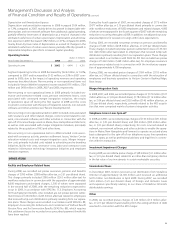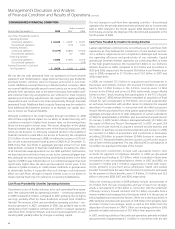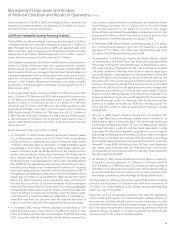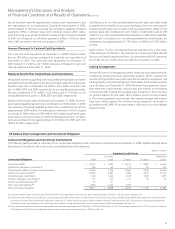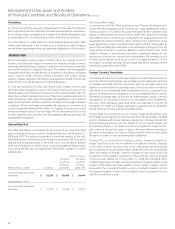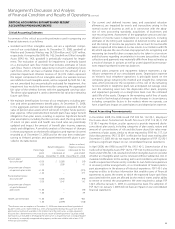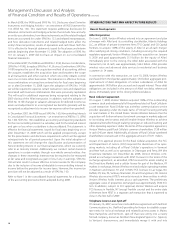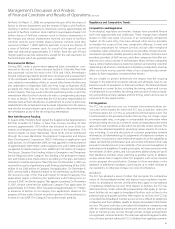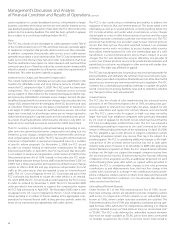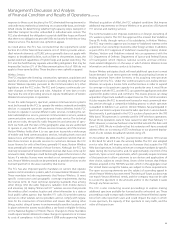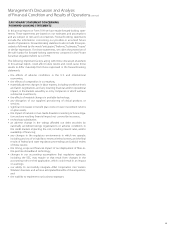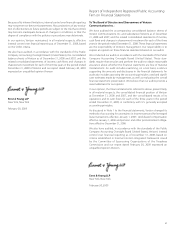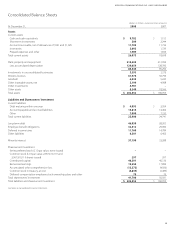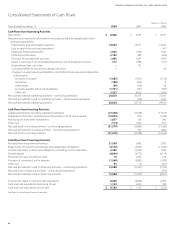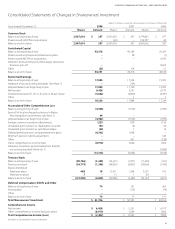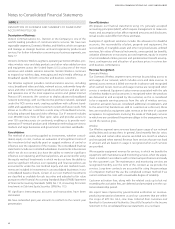Verizon Wireless 2008 Annual Report Download - page 35
Download and view the complete annual report
Please find page 35 of the 2008 Verizon Wireless annual report below. You can navigate through the pages in the report by either clicking on the pages listed below, or by using the keyword search tool below to find specific information within the annual report.Wireless’s acquisition of Alltel, the FCC adopted conditions that impose
additional requirements on Verizon Wireless in its provision of Enhanced
911 services and roaming services.
The Communications Act imposes restrictions on foreign ownership of
U.S. wireless systems. The FCC has approved the interest that Vodafone
Group Plc holds, through various of its subsidiaries, in Verizon Wireless.
The FCC may need to approve any increase in Vodafone’s interest or the
acquisition of an ownership interest by other foreign entities. In addition,
as part of the FCC’s approval of Vodafone’s ownership interest, Verizon
Wireless, Verizon and Vodafone entered into an agreement with the
U.S. Department of Defense, Department of Justice and Federal Bureau
of Investigation which imposes national security and law enforce-
ment-related obligations on the ways in which Verizon Wireless stores
information and otherwise conducts its business.
Verizon Wireless anticipates that it will need additional spectrum to meet
future demand. It can meet spectrum needs by purchasing licenses or
leasing spectrum from other licensees, or by acquiring new spectrum
licenses from the FCC. Under the Communications Act, before Verizon
Wireless can acquire a license from another licensee in order to expand
its coverage or its spectrum capacity in a particular area, it must file an
application with the FCC, and the FCC can grant the application only after
a period for public notice and comment. This review process can delay
acquisition of spectrum needed to expand services. The Communications
Act also requires the FCC to award new licenses for most commercial wire-
less services through a competitive bidding process in which spectrum
is awarded to bidders in an auction. Verizon Wireless has participated in
spectrum auctions to acquire licenses for radio spectrum in various bands.
Most recently, it participated in the FCC’s auction of spectrum in the 700
MHz band. This spectrum is currently used for UHF television operations.
By law those operations were to have ceased no later than February 17,
2009. However, a new law has been enacted that extends this date until
June 12, 2009. We do not believe that this extension will have a material
adverse effect on our testing of LTE technology or our planned deploy-
ment of a 4G wireless broadband network using LTE.
On November 26, 2008, the FCC granted Verizon Wireless 109 licenses
in this band for which it was the winning bidder. The FCC also adopted
service rules that will impose costs on licensees that acquire the 700
MHz band spectrum, including minimum coverage mandates by specific
dates during the license terms, and, for approximately one-third of the
spectrum,“openaccess”requirements,whichgenerallyrequirelicensees
of that spectrum to allow customers to use devices and applications of
their choice, subject to certain limits. Seven of the licenses that Verizon
Wireless acquired in the 700 MHz auction, which in the aggregate cover
the United States except for Alaska, are subject to these requirements.
The open access requirements are the subject of a pending appeal in
which Verizon Wireless has intervened. The timing of future auctions may
not match Verizon Wireless’s needs, and the company may not be able
to secure the spectrum in the amounts and/or in the markets it seeks
through any future auction.
The FCC is also conducting several proceedings to explore making
additional spectrum available for licensed and/or unlicensed use. These
proceedings could increase radio interference to Verizon Wireless’s opera-
tions from other spectrum users and could impact the ways in which
it uses spectrum, the capacity of that spectrum to carry traffic, and the
value of that spectrum.
33
response to these court decisions, the FCC eliminated the requirement to
unbundle mass market local switching on a nationwide basis, and estab-
lished criteria for determining whether high-capacity loops, transport or
dark fiber transport must be unbundled in individual wire centers. The
FCC also eliminated the obligation to provide dark fiber loops and found
that there is no obligation to provide UNEs exclusively for wireless or long
distance service. The decision was upheld on appeal.
As noted above, the FCC has concluded that the requirement under
Section 251 of the Telecommunications Act of 1996 to provide unbun-
dlednetworkelementsatTELRICpricesgenerallydoesnotapplywith
respect to broadband facilities, such as fiber to the premises loops, the
packet-switched capabilities of hybrid loops and packet switching. The
FCC also has held that any separate unbundling obligations that may be
imposed by Section 271 of the Telecommunications Act of 1996 do not
apply to these same facilities. Those decisions were upheld on appeal.
Wireless Services
The FCC regulates the licensing, construction, operation, acquisition and
transfer of wireless communications systems, including the systems that
Verizon Wireless operates, pursuant to the Communications Act, other
legislation, and the FCC’s rules. The FCC and Congress continuously con-
sider changes to these laws and rules. Adoption of new laws or rules
may raise the cost of providing service or require modification of Verizon
Wireless’s business plans or operations.
To use the radio frequency spectrum, wireless communications systems
must be licensed by the FCC to operate the wireless network and mobile
devices in assigned spectrum segments. Verizon Wireless holds FCC
licenses to operate in several different radio services, including the cel-
lular radiotelephone service, personal communications service, wireless
communications service, and point-to-point radio service. The technical
and service rules, the specific radio frequencies and amounts of spec-
trum we hold, and the sizes of the geographic areas we are authorized
to operate in, vary for each of these services. However, all of the licenses
Verizon Wireless holds allow it to use spectrum to provide a wide range
of mobile and fixed communications services, including both voice and
data services, and Verizon Wireless operates a seamless network that uti-
lizes those licenses to provide services to customers. Because the FCC
issues licenses for only a fixed time, generally 10 years, Verizon Wireless
must periodically seek renewal of those licenses. Although the FCC has
routinely renewed all of Verizon Wireless’s licenses that have come up for
renewal to date, challenges could be brought against the licenses in the
future. If a wireless license were revoked or not renewed upon expira-
tion, Verizon Wireless would not be permitted to provide services on the
licensed spectrum in the area covered by that license.
The FCC has also imposed specific mandates on carriers that operate
wireless communications systems, which increase Verizon Wireless’s costs.
These mandates include requirements that Verizon Wireless: (i) meet
specific construction and geographic coverage requirements during
the license term; (ii) meet technical operating standards that, among
other things, limit the radio frequency radiation from mobile devices
andantennas;(iii)deploy“Enhanced911”wirelessservicesthatprovide
the wireless caller’s number, location and other information to a state or
local public safety agency that handles 911 calls; (iv) provide roaming
services to other wireless service providers; and (v) comply with regula-
tions for the construction of transmitters and towers that, among other
things, restrict siting of towers in environmentally sensitive locations and
in places where the towers would affect a site listed or eligible for listing
ontheNationalRegisterofHistoricPlaces.Changestothesemandates
could require Verizon Wireless to make changes to operations or increase
its costs of compliance. In its November 4, 2008 order approving Verizon
Management’s Discussion and Analysis
ofFinancialConditionandResultsofOperations continued


